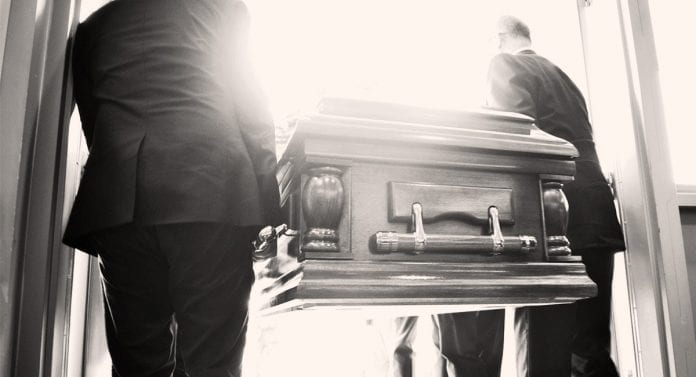With almost 40,000 COVID-19 associated UK deaths, many children will be facing their first Father’s Day without their dad – and many more without their grandad. Meanwhile, bereaved families are unable to mark the day with usual rituals, such as extended family get-togethers, due to lockdown restrictions.
While Father’s Day is a wonderful day of celebration for many – a day to recognise fatherhood, to thank our dads for all they do for us, and make them feel special and loved – it can be a very painful time for children and their families when dad has died.
Marketing goes mad and the barrage of adverts reminding us to buy cards and gifts provide painful reminders of what is missing. School and nursery activities might include making dad ‘something special’, and meanwhile, friends and peers may be unable to relate. All such things can make a child’s grief feel even more powerful and isolating.
13-year-old Lottie was three years old when her dad died. Five weeks ago marked the 10th anniversary of his death, just a day before her grandpa died from Covid-19:
“I don’t really remember much of Father’s Day when I was younger. But as I started to understand and grieve, I remember feeling torn, because when I was at primary school we would make gifts for Father’s Day and I never really knew who to give mine to. Should I give it to my stepdad, my grandpa, or should I make something to remind me of my dad?
“And when we did do things at school or at clubs, I always felt sad because everyone else had their dad and I didn’t.”
Winston’s Wish ambassador, Mark Lemon, was 12 when his father was murdered:
“I will never forget that heart-sinking feeling when the teachers sent me home from school, knowing something terrible had happened. I will never forget the police cars and the sound of my sister crying. When my mum told me dad had died, I just remember thinking, ‘I will never see my dad again. I will never play football with him again. I will never hold his hand again.
“He was my role model and he was gone and there was just this massive void. One minute I was sat at the kitchen table with him, and the next it was just me and an empty chair.
“For many years I wouldn’t even think about Father’s Day, I wouldn’t even acknowledge it.”
According to the childhood bereavement charity, Winston’s Wish, this year’s Father’s Day may be particularly challenging for many grieving families, as mortality rates have increased anxieties and fears, and social distancing rules restrict normal activities, rituals and routines. Calls into its helpline include those who are struggling with grief in lockdown, as well as from families facing their first Father’s Day without dad as a result of Covid-19.
“Under normal circumstances, poignant special occasions such as Father’s Day are already so painful for grieving children and families, when a parent has died, but this year it has been made all the more complicated by COVID-19”, explains Annie Anderton, a senior bereavement practitioner at Winston’s Wish.
“Lots of children and young people are telling us that their feelings have been amplified by the isolation lockdown has caused. Some say they have felt more hesitant to talk about difficult things, as they have no escape from the situation if they want it to stop thinking about it.
“For some children and young people, social distancing and lockdown restrictions will stop them doing the rituals and plans that they do every Father’s Day. For others, some of whom have been bereaved by COVID-19, this is their first Father’s Day without their dad and they are unsure what would feel right for them to mark the day.
“These are difficult times, but there are some important ways adults can support grieving children and young people through Father’s Day in lockdown”, explains Anderton:
- Acknowledge the existence of Father’s Day
One of the main things that children and young people tell us is that it is much easier for them if the important adults in their lives – parents, grandparents, teachers or adult friends – mention the fact that it is Father’s Day and that this might be a difficult time of year. They are not likely to have missed the fact that Father’s Day is coming up and by talking about it with them, we let them know that we are able, and willing, to talk about it and enable them to talk about it too.
2. Ask the child what they want to do
At Winston’s Wish, we always advocate for the child or young person’s voice to be heard. Choices about Father’s Day are no different. Some will want to mark it publically, some will want to do something privately and some will want to pretend the day doesn’t exist.
Some children and young people will want to send gifts and cards to other important men in their lives while some will want to give gifts and cards to their remaining parent who is doing the job of both parents
The most important thing is not to assume you know what they will want. What they did last year might be exactly what they want to do again – or they may want to do something completely different.
3. Listen
Listening to a child or young person is one of the most powerful ways you can support them around Father’s Day. It’s an occasion that can bring some powerful feelings. Feelings of isolation because they feel like they are the only one whose dad has died. Feelings of anger and jealousy towards others who have their fathers. Feeling a great sense of sadness and loss, as they are reminded that their dad has died. They may want to talk about this or they may try to tell us things through their behaviour: be mindful that children may become more withdrawn or short tempered and they may find separating from their remaining parent difficult.
By simply listening to what the child or young person is telling you, you are in fact providing them with something really healing and powerful. You are telling them that their feelings are normal and that you can tolerate them. Listening really is a super power!
4. Be creative
In this time of social distancing and restricted activities, it can be hard to know what to do on Father’s Day. Where you once went to their favourite pub or restaurant, all you can now do is stand outside. It’s time to get creative! With the help of the child/children or young person/people, maybe come up with what you would ideally like to do and then creatively think about what you could do instead. Here are a few suggestions to get you started:
- Want to go to their favourite food place? Why not try and recreate it at home
- Want to release a balloon with a message? Why not think about them and blow bubbles
- Want to visit a place they liked? Why not see if you can virtually visit it on Google Maps Street View
- Want to write them a card and put it on the grave? Why not write it and keep it in your memory box
- Want to spend it with another family? Why not have a Zoom get together where you talk about them
Lottie, now 13, says: “Now that I am older, Father’s Day is a day to remember lots of people – my dad and my stepdad (who has been amazing to me), and now also my grandpa. This is my first Father’s Day without him. But the day is no longer sad and more of what it should be: a celebration of the father figures in my life.
“I have a rock, which I have been painting ever since the first Father’s Day without my dad, and every year on Father’s Day I add another layer in memory of him.”
Mark, now 41, is married with two beautiful children and has become a successful children’s author, grief podcaster and ambassador for Winston’s Wish:
“When I became a dad myself, that’s when Father’s Day meant something again – in a nice way that I enjoy. It’s a bit like those other key dates across the year, like the day that he died; they’re points where I take an opportunity and space to reflect on him and remember him. I try not to view it negatively, but it is hard. It’s hard when you see all the Father’s Day adverts and emails coming in.
“It can also be a positive time for reflection though. I like to spend time with my children on Father’s Day and just reflect – and he is always present, always relevant, of course.
“To any child facing Father’s Day without their dad, firstly I’d say it’s ok to feel sad. It’s ok to feel all the emotions you’re feeling. It’s ok to smile and remember your father. The great times that you had together. Just have a moment of reflection: sit down and, if you’ve got a memory box, just get out something that was theirs and that you used to remember them using; a smell, his aftershave or something like that. Just take that space. On the day before just say to yourself, ‘ok tomorrow I’m going to take time just to sit down with his things’. If you haven’t got anything, then just use the memory in your head and have a bit of peace and remember. And talk to someone. If you’ve got someone there that you can talk to, your mum or your grandma, don’t be afraid to open up. Nine times out of ten, when you open it up and you talk to someone else, and share how you’re feeling, then it’s like a weight off your mind.
“What’s important is that children and young people (and adults) struggling with grief know that, although you will always miss that special person, you can go on to live a positive life after the death of a loved one.”
For more advice and guidance on how best to support grieving children and young people, Winston’s Wish has a Freephone National Helpline, staffed by fully trained bereavement practitioners, which is available between 9am and 5pm, Mon – Fri.
A wide range of free resources are also available on its website, which is kept up to date with the latest advice and guidance around issues affecting bereaved children and families.
Winstonswish.org
Freephone National Helpline: 08088 020 021

| [donate]
| Help keep news FREE for our readersSupporting your local community newspaper/online news outlet is crucial now more than ever. If you believe in independent journalism,then consider making a valuable contribution by making a one-time or monthly donation. We operate in rural areas where providing unbiased news can be challenging. |


















